Posts Tagged ‘OEM Manufacturers In China’
Must-Know Common Product Assembly Defects for Your Business Success
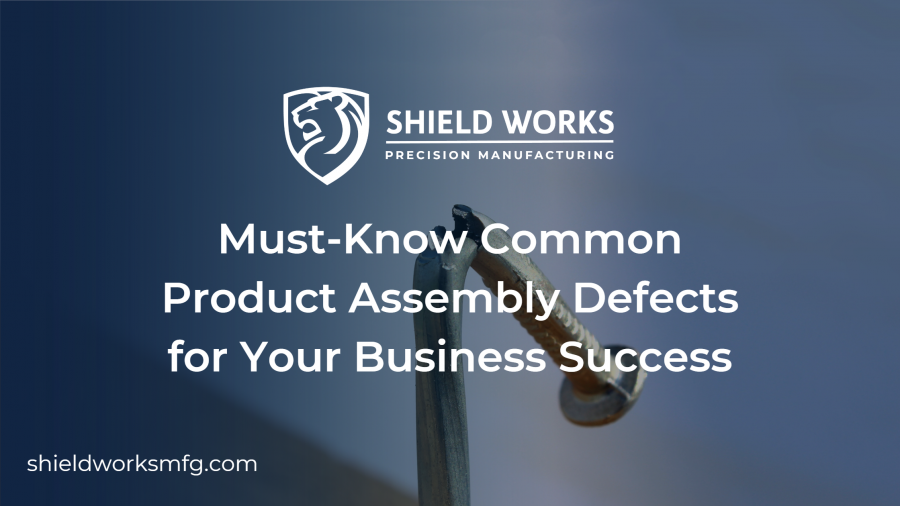
When importing goods, product assembly defects can pose a significant challenge for businesses. The consequences of discovering that your products are defective or hazardous after selling them to customers can be dire. In this article, we’ll dive into some of the most common assembly defects that can arise during a product manufacturing process and provide you with tips to steer clear of them.
Poorly Designed Molds
During the manufacturing process, molds are employed to give shape to the product. If the molds are poorly designed, they may produce misshapen or flawed products.
Precision molds, in particular, are critical for plastic products like toys. A mold that’s inadequately designed can also result in malfunctioning products that could pose a risk to the consumer.
To prevent this problem, it’s imperative to collaborate with a reputable manufacturer that has experience designing and manufacturing top-notch molds. A good manufacturer would typically have a team of engineers and designers who can develop molds that meet your requirements and are of exceptional quality.
They should also possess the appropriate equipment to create the molds and undertake quality control checks to verify that they meet the necessary standards.
Misaligned Parts
When the components of a product are not properly aligned during assembly, misaligned parts can occur, which can lead to unstable products that may break apart and cause safety hazards for users.
For instance, a child’s toy that is not assembled well can pose a significant risk of injury. To prevent misaligned parts, it is crucial to implement rigorous quality control measures, such as conducting visual inspections and testing finished products.
Additionally, manufacturers should have a dedicated quality control team that carries out checks throughout the manufacturing process to ensure that all components are assembled correctly.
By doing so, the likelihood of misaligned parts can be minimized, ensuring that the final product is both safe and reliable.
Poor Quality Control
Assembly defects can often be traced back to poor quality control, making it critical to have robust quality control processes in place. By adhering to these processes, manufacturers can ensure that their products meet safety standards and are of the highest quality.
To minimize the risk of defects, it’s crucial to choose a manufacturer with a strong quality control system in place. Such a manufacturer should have a dedicated team responsible for checking all products before shipping and conducting regular audits to identify opportunities for improvement in their production processes.
This approach will help ensure that the products are consistent, reliable, and meet consumer expectations.
Inconsistent Materials
When it comes to product assembly, using inconsistent materials can lead to defects. The variation in material quality can make it challenging to achieve consistency in the end product. The outcome may be products that are unsightly or malfunctioning.
To prevent this issue, it’s crucial to ensure that your manufacturer sources materials of high quality and implements a reliable system to detect inconsistencies in the materials.
This may involve conducting tests on materials before they are used in production and maintaining consistent material suppliers.
Furthermore, manufacturers must carry out routine quality control checks on materials to ensure that they meet the required standards.
Improperly Installed Components
Inadequately installed components may give rise to assembly defects, which occur when a component is improperly installed during the manufacturing process. This may lead to products that are either unfit for their intended purpose or unsafe for consumers.
To steer clear of such problems, it is essential to implement a rigorous quality control process to verify that all components are installed correctly. This process can include thorough visual inspections and testing of finished products.
Moreover, manufacturers should establish a quality control team that is accountable for scrutinizing all components before they are assembled into finished products. By doing so, they can prevent potential complications and ensure that their products meet the highest quality standards.
Lack of Training
Poorly trained workers can cause defects in products, in addition to using inconsistent materials. To avoid this, it’s crucial to collaborate with manufacturers that have a highly skilled and trained workforce.
It’s important for workers to receive proper training on how to operate equipment, assemble products, and follow safety protocols to avoid errors during the manufacturing process that could lead to defects.
Insufficient training could also put workers at risk of facing safety hazards. Therefore, it’s necessary to ensure that the manufacturer you choose implements a training program for its employees and provides regular updates on new processes and procedures to maintain high standards.
Imported products from can suffer from product assembly defects that pose a significant problem for businesses. To avoid these costly mistakes, it’s important to identify the common causes of these defects and take necessary measures.
Moreover, a robust quality control system should be in place to ensure the safety and durability of your products. By following these guidelines, you can minimize the risk of defects and guarantee that your products meet the highest standards of excellence.
Collaborating with a reliable manufacturer that has extensive experience in designing and producing superior quality products can help you achieve just that. Shield Works is a well-seasoned manufacturer with 18 years in the industry and a full-fledged in-house assembly facility housing an IPR-protective zone of production, as well as partnerships with 500+ suppliers. Contact us today!
How to Optimize Logistics and Shipping with a Chinese OEM
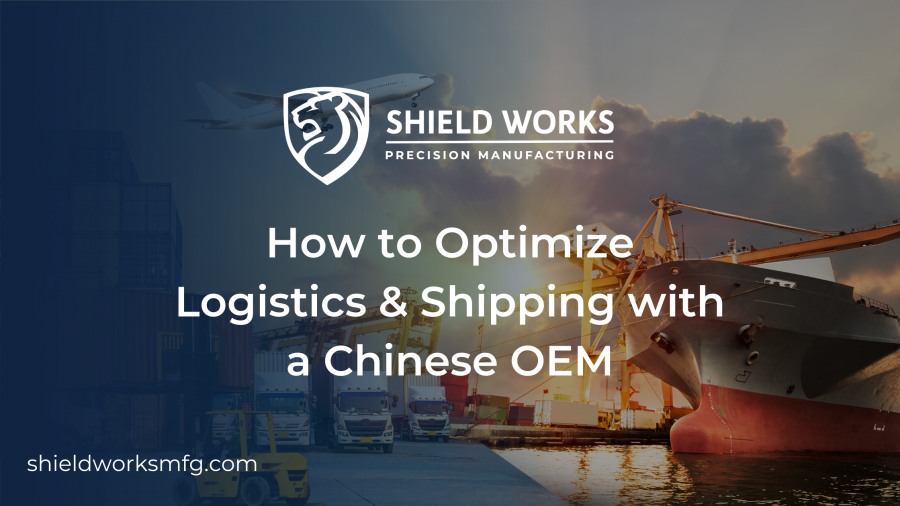
When it comes to running a successful business, logistics and shipping are two crucial factors that can’t be overlooked. Having a reliable supplier that can handle all your shipping needs is essential, especially if you’re sourcing products from China. In this article, we’ll explore how you can optimize your logistics and shipping processes with a Chinese OEM (Original Equipment Manufacturer).
What is an OEM?
Before we dive into the specifics of optimizing logistics and shipping with a Chinese OEM, let’s first define what an OEM is. An OEM is a company that produces parts or products that are used in another company’s final product. For example, a Chinese OEM might produce a component for a smartphone that is then assembled by a different company and sold under their brand.
Why Work with a Chinese OEM?
Working with a Chinese OEM can have many advantages. First and foremost, China is known for its low-cost manufacturing, which means you can often get high-quality products at a lower cost than sourcing domestically. Additionally, many Chinese OEMs are experienced in international shipping and can handle all aspects of the logistics process, including customs clearance and delivery to your doorstep.
Choosing the Right Chinese OEM
Choosing the right Chinese OEM is crucial to the success of your logistics and shipping processes. There are a few key factors you should consider when selecting a supplier:
Experience
Look for a supplier that has experience working with companies in your industry and has a proven track record of delivering high-quality products.
Communication
Communication is essential when working with a supplier in another country. Look for a supplier that is responsive to your emails and willing to communicate via phone or video calls when necessary.
Location
Consider the location of your supplier and how it will impact shipping times and costs. A supplier located near a major port may be able to offer faster and more affordable shipping options.
Optimizing Logistics and Shipping with a Chinese OEM
This involves several crucial steps that can help streamline your operations, reduce shipping costs, and ensure that your shipments arrive on time and in good condition.
Consolidate Shipments
Consolidating your shipments is an effective way to save money on shipping costs. Instead of shipping multiple orders separately, you can combine them into one shipment, taking advantage of economies of scale and negotiating better rates with your freight forwarder. By consolidating your shipments, you can also reduce the number of shipments you receive, which can help you streamline your receiving processes and reduce administrative costs.
Plan Ahead
Planning ahead is essential when it comes to international shipping. Be sure to factor in lead times for manufacturing and shipping when placing orders with your Chinese OEM. Additionally, work with your supplier to create a production and shipping schedule that aligns with your inventory needs. By planning ahead, you can avoid rush fees and ensure that you have enough inventory to meet customer demand.
Use a Reliable Freight Forwarder
Choosing a reliable freight forwarder is critical when shipping from China. A freight forwarder can handle all aspects of the logistics process, including customs clearance, transportation, and delivery to your warehouse or fulfillment center. Look for a freight forwarder that has experience working with Chinese suppliers and can provide you with a range of shipping options, including air and sea freight. A reliable freight forwarder can help you navigate the complexities of international shipping and ensure that your shipments arrive on time and in good condition.
Optimize Packaging
Optimizing your packaging can help you reduce shipping costs and minimize the risk of damage during transit. Work with your Chinese OEM to design packaging that is both lightweight and durable, and that can be stacked efficiently to maximize container space. By optimizing your packaging, you can reduce the volume and weight of your shipments, which can help you save money on shipping costs and reduce your carbon footprint.
Keep Track of Your Inventory
Keeping track of your inventory is critical when working with a Chinese OEM. Make sure you have a system in place to track incoming shipments and inventory levels, and be sure to communicate regularly with your supplier to avoid stockouts or overstocking. By keeping track of your inventory, you can ensure that you have enough stock to meet customer demand and avoid the costs and delays associated with stockouts.
Optimizing logistics and shipping with a Chinese OEM can be a complex process, but by following these tips, you can streamline your operations and save money on shipping costs. Remember to choose a reliable supplier, plan ahead, and work with experienced freight forwarders to ensure your shipments arrive on time and in good condition.
By taking these steps, you can build a strong partnership with your Chinese OEM, one like Shield Works with 18 years of industry experience and both Chinese and international logistics partners, to ensure the success of your business for years to come. Contact us now!
Why Customized Manufacturing is the Best Option for Your Business
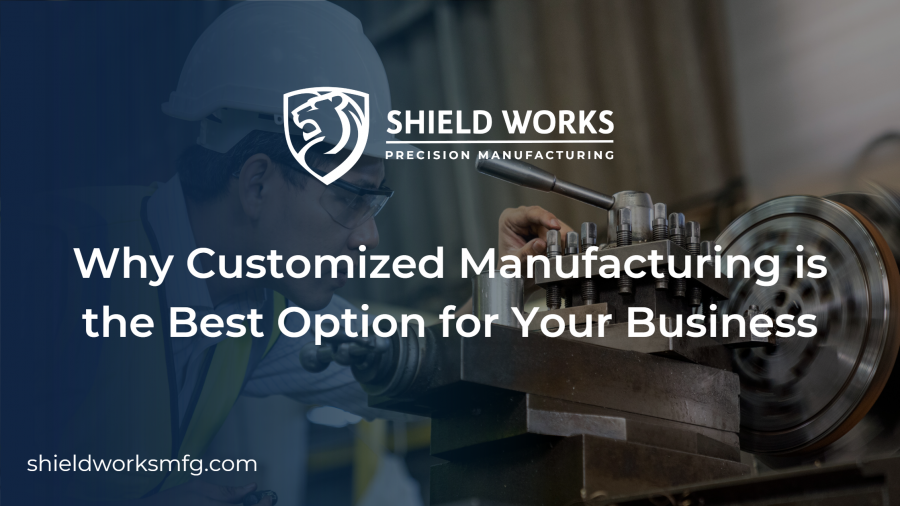
Have you ever found yourself grappling with mass-produced products that don’t quite fit the bill of your particular requirements? Have you ever encountered the frustrating circumstance of having to compromise on the design, quality, or functionality of a product simply because it was the only option available on the market? If this is the case, then it’s possible that customized manufacturing is the ideal solution for your business.
In this article, we will delve into the advantages of customized manufacturing and the manner in which it can aid in improving your business operations and augmenting customer satisfaction. From design flexibility to cost savings, we will cover everything that you need to know to make an informed decision regarding customized manufacturing.
Design Flexibility: Unparalleled Advantage
One of the most crucial benefits of customized manufacturing is the unparalleled degree of flexibility that it offers when it comes to design. When you opt to work with a custom manufacturer, you are afforded the freedom to design products that are specifically tailored to meet your particular needs and requirements. You have the liberty to choose materials, dimensions, colors, and finishes that align with your brand and vision.
Moreover, customization allows you to create products that are distinctive and stand out from your competitors. You can integrate innovative features, functionalities, and designs that augment the value of your products and attract more customers. Customization further enables you to customize your products to different markets, demographics, and niches, providing you with a competitive advantage in the market.
Better Quality and Durability: Key Benefits
Another significant advantage of customized manufacturing is the better quality and durability of the products. When you choose to work with a custom manufacturer, you can rest assured that your products are manufactured with top-notch materials and components. You can also oversee the production process to ensure that manufacturing standards and quality control measures are adhered to.
Customized manufacturing also allows you to create products that are robust and long-lasting. You can choose materials that are resistant to wear and tear, corrosion, and environmental factors that affect the product’s lifespan. Furthermore, you can design products that are easy to maintain, repair, and upgrade, thereby reducing the overall cost of ownership and improving customer satisfaction.
Improved Efficiency and Cost Savings: A Winning Combination
Customized manufacturing can also help you improve your business efficiency and reduce costs. When you choose to work with a custom manufacturer, you can optimize the production process to minimize waste, reduce lead times, and improve resource utilization. You can also streamline the supply chain and lower inventory levels by ordering products on-demand.
Moreover, customized manufacturing can help you save costs in the long run. By creating products that cater to your specific needs, you can reduce the costs of purchasing and maintaining multiple products. You can also steer clear of the costs associated with product recalls, returns, and replacements, which can be substantial for mass-produced products that have a high failure rate.
Increased Customer Satisfaction and Loyalty: A Personal Touch
Customized manufacturing can also help you augment customer satisfaction and loyalty. By creating products that cater to your customer’s specific needs and requirements, you can provide a personalized experience that sets you apart from your competitors. You can also ensure that your products meet or exceed your customer’s expectations in terms of quality, design, and functionality.
Furthermore, customized manufacturing allows you to build a relationship with your customers based on trust and transparency. You can involve your customers in the design and production process, obtaining their feedback and suggestions to improve the products. You can also provide after-sales services, such as maintenance, repair, and upgrades, that enhance the overall customer experience and satisfaction.
Improved Brand Image: An Invaluable Asset
When it comes to branding, perception is everything. In today’s marketplace, consumers are becoming increasingly discerning about the products they purchase and the companies they support. Customized manufacturing can be a potent tool in improving your brand image and standing out from the competition. By offering customized products, you demonstrate to your customers that you care about their unique needs and preferences, building trust and loyalty, as well as encouraging positive word-of-mouth marketing.
In addition to this, customization allows you to showcase your company’s creativity and innovation, positioning you as a leader in your industry. Furthermore, customized products can help you stand out in a crowded marketplace. With so many similar products available, customization can be a way to differentiate yourself and offer something truly unique. This can help you attract new customers and retain existing ones, ultimately leading to increased sales and revenue.
Moreover, a strong brand image can help you weather the storms of the market and consumer trends. It can help you maintain customer loyalty and keep your products relevant, even as new players enter the market. By offering customized products, you can create a reputation for quality, innovation, and customer service that will keep your brand strong and valuable for years to come.
Customized manufacturing can offer significant benefits to businesses that are looking to improve their operations and customer satisfaction. From design flexibility to cost savings, customized manufacturing can help you create products that are tailored to your specific needs and requirements, while also improving your brand image and customer loyalty.
By partnering with a reliable and experienced custom manufacturer like Shield Works, with a an international team of engineers and designers as well as in-house assembly where an IPR protective zone is housed, you can ensure that your products are made with high-quality materials and components, meet or exceed your customer’s expectations, and stand out from your competitors in the market. Contact us today!
How to Choose the Right Contract Manufacturer in China
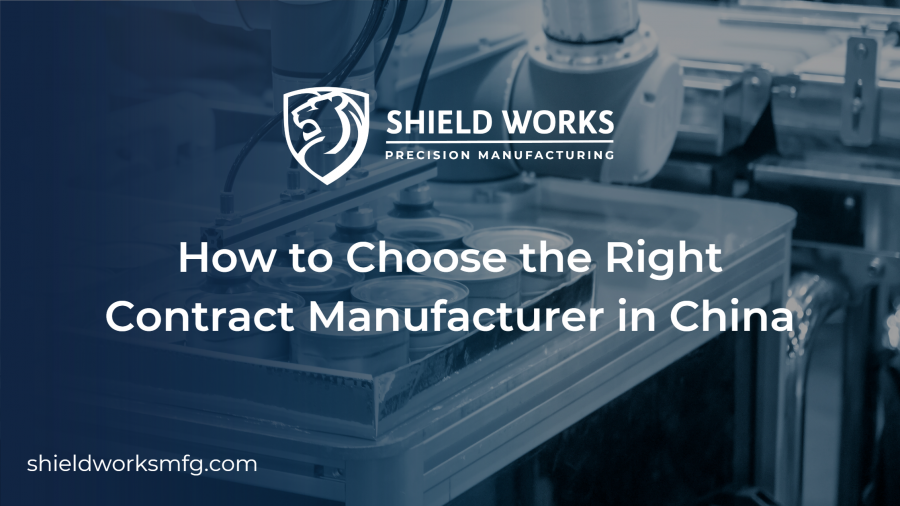
If you’re considering outsourcing your manufacturing operations, China might be an option you’ve already explored. With its vast manufacturing industry, China is a popular destination for companies seeking to manufacture their products at a lower cost. However, with numerous contract manufacturing companies in China, selecting the right one can be challenging.
In this article, we’ll take you through the process of selecting the best contract manufacturing company in China for your needs, keeping in mind the importance of perplexity, burstiness, and low predictability in our writing style.
Step 1: Determine Your Manufacturing Needs
To choose the right contract manufacturing company in China, you must first determine your manufacturing needs. Consider the type of product you want to manufacture, the quantity you require, and your budget. Knowing your needs will help you narrow down your search to companies that specialize in your industry and can meet your production requirements.
Step 2: Research and Shortlist Contract Manufacturing Companies
After determining your manufacturing needs, it’s time to research and shortlist contract manufacturing companies in China. Look for companies that have experience in your industry and offer the services you require. You can use search engines, industry directories, and trade shows to find potential manufacturers. Shortlist at least three to five companies that meet your requirements.
Step 3: Evaluate the Shortlisted Contract Manufacturing Companies
With a shortlist of contract manufacturing companies in China, it’s time to evaluate them. Look for information about their manufacturing capabilities, quality control processes, and certifications. You can also check their website, social media, and online reviews to see what their clients say about their services.
To assess their communication skills, responsiveness, and transparency, it’s a good idea to reach out to the companies and request more information. You can ask for a quote, references, or even arrange a visit to their factory.
Step 4: Compare and Choose the Best Contract Manufacturing Company
After evaluating the shortlisted companies, it’s time to compare and choose the best contract manufacturing company in China for your needs. Consider factors such as their experience, quality, pricing, lead times, and communication skills. Additionally, look for a company with a good reputation that can provide references from satisfied clients.
Before starting any manufacturing project, it’s essential to have a detailed contract in place that outlines all the terms and conditions of the agreement, including payment terms, delivery dates, quality standards, and intellectual property rights.
Step 5: Maintain a Good Relationship with Your Contract Manufacturing Company
Once you’ve chosen a contract manufacturing company in China, it’s crucial to maintain a good relationship with them. Regular communication, timely payments, and feedback can help you build a long-term partnership with your manufacturer. A good relationship can lead to better quality products, faster lead times, and more competitive pricing.
Apart from the above steps, there are a few other things to keep in mind when choosing a contract manufacturing company in China.
Cultural Differences
Firstly, you must consider the cultural differences between China and your home country. It’s essential to understand these differences to avoid any misunderstandings or communication gaps.
Shipping & Logistics
When working with a contract manufacturing company in China, you must consider the cost of shipping and logistics. This includes factoring in the cost of shipping, import duties, and taxes when calculating the total cost of production.
Geopolitics
You must consider the political and economic climate in China as it can significantly impact the manufacturing industry. It’s crucial to keep an eye on any developments that may affect your manufacturing project.
Regulations & Standards
Also ensure that the contract manufacturing company you choose in China is compliant with all the relevant regulations and standards. This includes labor laws, environmental regulations, and quality standards.
As a final note, it’s important to mention that the process of choosing the right contract manufacturing company in China can be time-consuming and requires careful consideration. Rushing into a partnership with a manufacturer without doing proper research and evaluation can lead to costly mistakes and potential production delays.
By following the steps outlined in this article and taking into account the additional considerations mentioned, you can increase your chances of finding a reliable and trustworthy contract manufacturing partner in China. With the right partner, you can achieve your manufacturing goals, maintain quality standards, and remain competitive in your industry.
In conclusion, outsourcing your manufacturing operations to China can be a viable option for companies looking to reduce costs and increase production capacity. However, it’s crucial to choose the right contract manufacturing company that meets your needs, has a good reputation, and is compliant with all relevant regulations and standards, one like Shield Works, with our own precision assembly facility and network of over 500 suppliers, and 18 years of industry experience. Contact us today, and achieve success in your manufacturing projects.
OEM Standards: Why They Matter and What They Are
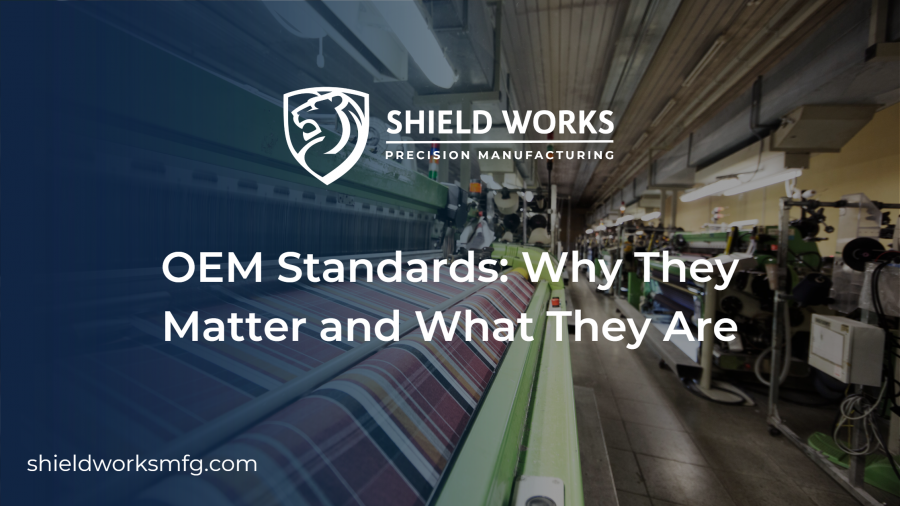
Original Equipment Manufacturer (OEM) standards are the requirements that manufacturers must meet when producing parts or components for a specific product.
These standards are set by the company that originally designed the product, and they outline the quality, safety, and reliability requirements that must be met in order for the parts to be considered acceptable for use in that product.
In this blog post, we will explore why OEM standards are important and how they impact product performance.
Why OEM Standards Matter
OEM standards matter for several reasons, including quality, safety, and reliability.
Quality
First and foremost, OEM standards help to ensure that products are of a consistent quality. By setting specific requirements for materials, manufacturing processes, and testing procedures, manufacturers can minimize variations in product quality and ensure that each component meets the same high standards.
This can help to improve the overall quality of products and increase customer satisfaction.
Safety
In addition, OEM standards are important for ensuring the safety of products. Manufacturers must comply with specific safety regulations and standards to ensure that their products are safe to use.
This may include requirements for components that are flame-retardant, non-toxic, or resistant to high temperatures, among other things. By meeting these safety standards, manufacturers can help to prevent accidents and injuries that may result from product failures or malfunctions.
Reliability
Reliability is another important factor that is impacted by OEM standards. By setting specific requirements for materials, manufacturing processes, and testing procedures, manufacturers can help to ensure that their products are reliable and perform as intended.
This can reduce the risk of product failures or malfunctions that can result in costly repairs or replacements, as well as damage to the manufacturer’s reputation.
In addition to these factors, complying with OEM standards can also have other benefits. For example, it can help manufacturers to streamline their production processes, reduce waste, and improve efficiency. It can also help to encourage innovation and the development of new technologies and methods that can improve product performance and reliability.
How OEM Standards Impact Product Performance
OEM standards play a critical role in determining the performance of a product. There are several ways in which these standards can impact product performance, including materials, manufacturing processes, and testing.
Materials
One of the most important ways in which OEM standards impact product performance is through the use of high-quality materials. This includes:
Material selection
Manufacturers must carefully select the materials used in their products, taking into account factors such as durability, strength, and resistance to wear and tear.
Material quality
The quality of the materials used can impact the performance of the product over time. Using high-quality materials can help to ensure that the product performs well and meets the specific needs of customers.
Manufacturing Process
Manufacturing processes also play a key role in determining product performance. This includes:
Consistency
Manufacturers must ensure that their manufacturing processes are consistent and repeatable in order to minimize variations in product quality and ensure that each component meets the same high standards.
Quality control
Techniques such as statistical process control, automated testing, and continuous improvement programs can help manufacturers improve product performance and reliability, and reduce the risk of defects or malfunctions.
Testing
Testing is another important aspect of OEM standards that impacts product performance. This includes:
Performance testing
Manufacturers must rigorously test each component to ensure that it meets specific performance criteria. This may include tests for strength, durability, resistance to temperature and humidity, and compatibility with other components in the product.
Environmental testing
In some cases, manufacturers may also conduct environmental testing to ensure that their products can withstand harsh conditions, such as extreme temperatures or exposure to saltwater. By conducting these tests, manufacturers can identify and correct potential performance issues before they become a problem for customers.
Design & Innovation
In addition to these factors, OEM standards can also impact product design and innovation. This includes:
Encouraging innovation
By setting specific requirements for materials, manufacturing processes, and testing procedures, manufacturers can encourage the development of new technologies and methods that can improve product performance and reliability.
Creating better products
This can lead to the creation of new products that meet the evolving needs of customers and perform better than previous generations. By staying up to date with OEM standards, manufacturers can create products that are safer, more reliable, and better suited to the needs of their customers.
Overall, OEM standards are important for ensuring the quality, safety, and reliability of products.
By setting specific requirements for materials, manufacturing processes, and testing procedures, manufacturers can improve the overall quality of their products, reduce the risk of accidents or injuries, and protect their reputation in the marketplace.
Whether you are a consumer, manufacturer, or regulator, understanding OEM standards is essential for ensuring the safety and reliability of the products we use every day.
At Shield Works, we understand the importance of OEM standards and the impact they have on product performance. With over 18 years of experience in the industry, we have a professional engineering team that can help you meet the ideal OEM specs and standards for your product. Contact us today to learn more about how we can help you meet your OEM standards and take your product to the next level.
Choosing an OEM Parts Manufacturer: A Complete Guide
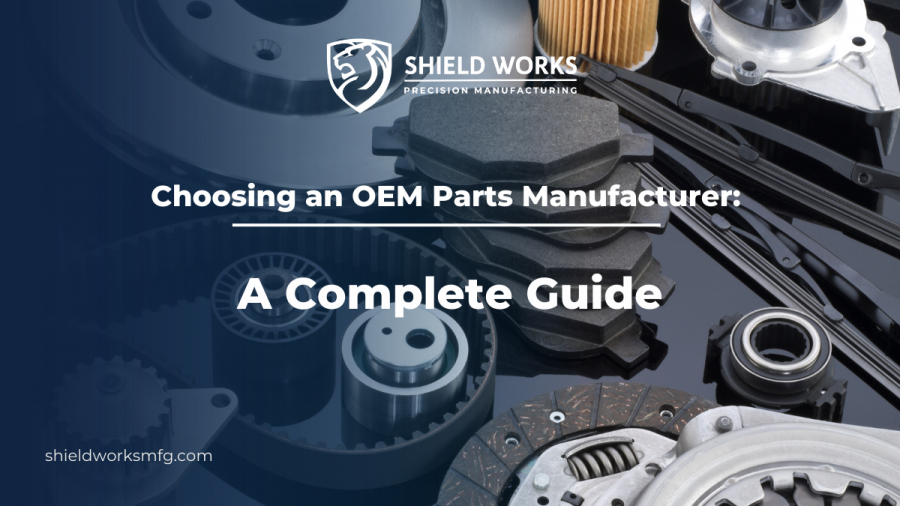
Apple is one of the largest companies in the world, with its iPhone being one of the most popular smartphones on the market. If you’ve ever held an iPhone in your hand, you know it’s a premium, well-made device. So it may come as a big shock that Apple does not manufacture almost any of its individual parts.
Instead, Apple sources OEM parts from other companies. They get accelerometers from Germany, gyroscopes from Switzerland, and batteries from China. Apple even sources some of its parts from direct competitors, such as Samsung.
This is common practice in the world of manufacturing. And it’s one that can make your business more efficient and cost-effective.
What are OEM products, and how does one choose an OEM vendor? We hope to answer that and many other questions here. Keep reading for a definitive guide on OEM parts and finding good manufacturers.
What Are OEM Parts?
OEM stands for Original Equipment Manufacturer. The screen on an Apple device has an Apple label, but the OEM is actually Samsung. Samsung makes the screen, sells it to Apple, and Apple claims the screen as its own.
It’s a continuous cycle. The iPhone gets high-quality screens for a good price, and Samsung sells more screens. As counterintuitive as it may seem, this is a mutually beneficial relationship that is unlikely to end.
Samsung is unafraid to admit this because it only proves that its screens are of the highest caliber. Apple does not want to burn a valuable business partner, either.
This practice extends far beyond consumer electronics. Car parts, printers, and countless small electronics require OEM parts.
Why Not Manufacture In-House?
You may be wondering why Apple does not produce the screen itself. At first glance, it would seem to be a better deal overall. Apple could potentially save money and create screens that meet their expectations exactly.
But upon closer examination, it’s not as easy as just manufacturing some screens. Screens require specific manufacturing hardware, long processes, insider knowledge, and a workforce equipped to make them.
If Apple were to manufacture its own screens, it would likely cost them billions of dollars to create the production lines. Sure, they will get custom Apple screens. But the cost would put a huge dent in their operational expenditures.
Samsung already has the infrastructure to make screens. They have know-how and years of industry experience. They can produce the screens cheaply and sell them to companies like Apple.
In short, OEM products give companies access to affordable parts that would otherwise cost a fortune to make.
Benefits of OEM Parts for Small Businesses
OEM products are not just for gigantic companies like Apple. They are a means for smaller companies to save money on manufacturing, without sacrificing quality.
Apple not only purchases OEM parts but also outsources its manufacturing to other companies. Foxconn, for example, makes custom Apple silicon chips. This allows Apple to scale up and down in response to demand, and easily pivot toward new products.
The same is true for your company. OEM parts will allow you to manufacture on a smaller budget, compared to manufacturing yourself. It’s an excellent way for small businesses to get their foot in the door, as it were.
As your business grows, you can scale up to meet demand. Most OEM vendors have the ability to adapt to your ever-changing business requirements.
With all that said, let’s discuss how you can find an OEM parts manufacturer.
Things to Look for in a Reliable OEM Vendor
As you shop around the OEM vendor market, you will discover a huge number of manufacturers. There are hundreds of companies, from Shenzhen to Beijing, looking to make your product a reality. But as you might expect, there are some bad eggs among the bunch.
There are some important do’s and don’ts when working with foreign companies. Some of them amount to cultural differences, but others may be unsavory business practices.
Here are a few key points to get you in the right direction.
GMP Compliance
GMP, also known as Good Manufacturing Practice, ensures that the company you work with adheres to the highest manufacturing standards. Regulations vary depending on your country or region. But the name is self-explanatory, to make sure companies behave well during the manufacturing process.
Part of GMP compliance is the implementation of a quality management system or QMS. This is a body of processes, policies, and procedures to ensure OEM parts meet the highest standards. A QMS ranges from procurement of raw materials to the finished products at the end.
GMP compliance includes specialized employee training and regular audits of the process. This means having accurate records and making adjustments over time to improve.
Find a company that is GMP compliant before you settle on a contract.
Understanding OEM vs. ODM
OEM refers solely to the manufacturing of individual parts that go into a product. However, the company that makes these OEM products uses its own design and engineering team to create them. When you buy an OEM product, you are essentially picking a ready-made product off the shelf.
However, some companies have very specific needs for their products. The OEM parts that a vendor makes may not be sufficient for your standards. In that case, you might feel better suited to an ODM manufacturer.
ODM, which stands for Original Design Manufacturer, designs a product according to your specifications. Then they manufacture this product for you. The only part left for your company is assembly.
A perfect example of ODM is car chargers for electric vehicles. In this case, the design of the plug across car chargers is very similar. But each design has a custom brand, unique coloring, and entirely different packaging.
Good Reputation
A common issue with Chinese companies is that they can easily shut down one company and open another. A company with a bad reputation can become a new company with a fresh slate overnight. Many who consider outsourcing to China understand this as one of the risks involved.
Just like any business relationship, you must establish bona fides. It pays to do your research about a company’s past dealings. If the information runs dry after digging only a few years deep, you may have a problem.
Word-of-mouth is an excellent tool in the manufacturing industry. Other companies you know or have worked with may have had bad run-ins with specific manufacturers.
Of course, there are always online reviews that you can check out. Aggregate reviews can provide an intimate window into a company’s dealings with past customers.
Capabilities
Technology advances at a breakneck pace. As it concerns chip manufacturers, this means that new processes get outdated within years of their fabrication.
For example, 10 nm chips release one year, then shrink down to 7 nm the next. Each shrinkage requires completely retooling the factory to make the updated chip.
Granted, not many industries upgrade at the same pace that silicon manufacturers do. But generally speaking, industry innovation in all fields grows at a steady pace.
Ideally, you want a manufacturer that uses the most modern processes. The more modern it is, the more efficient and cost-effective a company can be.
Older processes deprive you of all the new advancements. Plus, a company that can support current advancements is likely better off financially. Having modern processes also means they have highly skilled people onboard.
Things to Avoid in an OEM Vendor
Naturally, there are big red flags that you should spot before signing any contracts. Some of these are small things that can be remedied easily. Others are a very clear no-go and you should avoid them if at all possible.
Inconsistent Communication and Language Barriers
It’s understandable that there will be communication delays between East Asia and your headquarters. It’s difficult to convey things over email or even a video call. But you want to avoid OEM vendors that don’t give you consistent, comprehensive communication.
A good vendor will update you through every step of the process. They will alert you promptly to any delays and communicate any manufacturing challenges. They will help you achieve a seamless assembly process and take into account any input you may have.
Language barriers can provide misunderstandings. And even if there is no language barrier, there may be cultural barriers. Having a company that tries to bridge this gap with you will be invaluable.
To be clear, you shouldn’t discount a manufacturer only on account of a language barrier. It’s how both parties overcome that barrier that matters.
Constant Delays and Manufacturing Issues
Some manufacturers may prove to be a pain in the neck throughout the process. There may be constant delays in finishing a run of products. These delays may cost you money, create logistics issues, and prevent you from distributing your product on time.
Delays will happen from time to time. But if they are very, very frequent–without good explanation–then this may point to bigger internal issues.
For example, your manufacturer may be biting off more than it can chew. They may have attempted to fulfill more orders than they have the capacity for. This leads to them prioritizing some customers over others.
Ensure that they have the capacity to meet your needs. If they are bogged down with too many orders, you may want to look elsewhere.
Lackluster Prototype Models
Before doing a run, it’s common practice to produce a few prototype models. This gives you a physical example you can hold in your hand. You can see with your eyes and feel for yourself the quality of the manufacturing.
This is an excellent chance to see from the start what you’re going to get. You can ask for quality checks throughout production. If there is any degradation in the product, it allows you to identify what has happened.
If they cannot get your OEM parts up to snuff from the beginning, then perhaps you should shy away from that company.
Reasonable Pricing
Everyone wants a good deal, but you don’t want an agreement that seems too good to be true. You get what you pay for, after all. An unnaturally low price is a good sign that you might be getting a low-quality product.
Take a look at comparable rates from other companies. This gives you a good idea of what you should expect to pay for bulk OEM parts. This way you can find a good balance between an affordable price and parts that meet your quality standards.
Protection of Your Intellectual Property Rights
Intellectual property theft is a risk you have to take into account when working with Chinese companies. As such, you should prioritize companies that keep your intellectual property safe.
This usually isn’t a huge issue with OEM manufacturers, since they design the products. However, if you share blueprints and schematics of your products, you are likely sharing valuable IP information.
Only trust companies who have a reputation for protecting this valuable information. Otherwise, you may see your patented product designs appearing in cheap Chinese products, with no recourse for legal action.
Get Custom Manufacturing with Shield Works
OEM parts allow companies of all sizes to get high-quality components for affordable prices. If you decide to source your OEM products from a vendor, take the time to vet them well. Keep the above tips in mind before you settle on a contract manufacturing run.
Shield Works serves professionals in all industries. We do assembly, manufacturing, and much more. Contact us today to find out how we can help you get the best OEM parts for your business.
Made in China: Its Pros & Cons
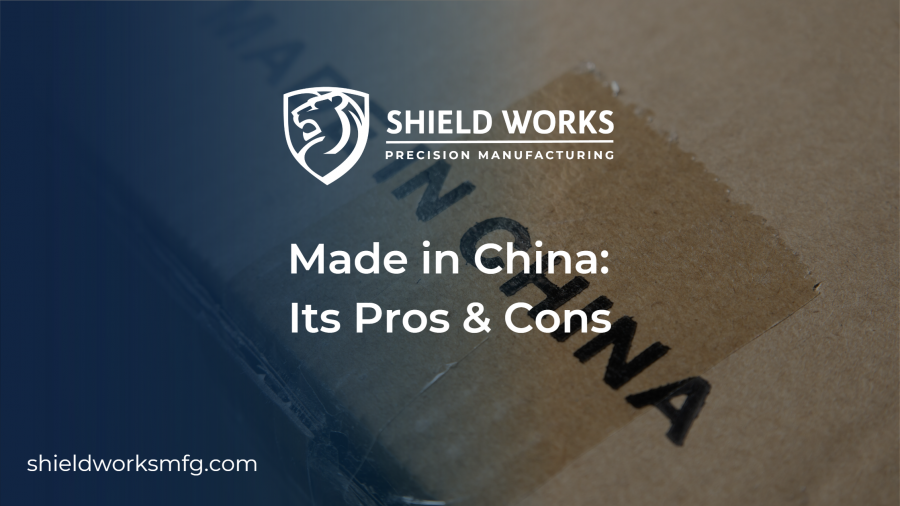
If you have ever purchased a product, it is quite likely that it was made in China. China is the world’s largest exporter and has been manufacturing products for decades. The country’s lower labor costs and large workforce have made it a top destination for businesses looking to pursue higher cost-effectiveness, against all odds.
While there are many benefits to products made in China, there are also drawbacks that you should consider. In this article, we will explore the pros and cons of manufacturing in China.
Pros
Cost Savings
One of the most significant benefits of manufacturing in China is cost savings.
Labor costs in China are lower compared to many other countries, which allows businesses to save on labor costs and invest in other areas of the business such as research and development, marketing, or expanding their product line.
This cost savings can give businesses a competitive edge in the market and allow them to offer products at a lower price point.
Wide Range of Products
China is known for its diverse manufacturing industry that can meet the needs of many businesses. From clothing and electronics to furniture and toys, businesses have access to a wide range of products to sell.
This diversity allows businesses to find suppliers for their specific needs and gives them more options to choose from.
Additionally, Chinese manufacturers have experience in producing large volumes of goods, which can be a significant benefit for businesses looking to scale their operations.
Established Supply Chain
Another benefit of manufacturing in China is the established supply chain.
The country has a well-developed infrastructure that allows for efficient transportation of goods and materials. Additionally, there are many suppliers and manufacturers in China that businesses can work with, making it easier to find the right partner for their needs.
This established supply chain helps businesses reduce costs, increase efficiency, and improve the speed of delivery.
Improved Quality Control
China has made significant improvements in quality control in recent years.
Many manufacturers have invested in new technologies and processes to improve the quality of their products.
This can be a significant benefit for businesses that want to ensure that their products meet high standards. Improved quality control can help businesses reduce costs associated with returns, refunds, and negative customer feedback.
Scalability
Chinese manufacturers have the ability to rapidly scale up production to meet increased demand.
This is due to the country’s large and highly skilled workforce, as well as the advanced technology and equipment that many manufacturers possess.
For businesses looking to expand their product offerings or enter new markets, manufacturing in China can offer the scalability needed to meet growing demand without sacrificing quality or increasing costs.
Additionally, Chinese manufacturers can often provide customized solutions for businesses looking to create new products or modify existing ones to better suit their needs.
Cons
Labor Laws and Working Conditions
China has faced criticism for its labor laws and working conditions in some factories. Reports of long working hours, low wages, and poor working conditions have raised concerns about worker exploitation.
This can be a reputational risk for businesses that partner with manufacturers that have poor labor practices.
Businesses need to conduct proper due diligence to ensure they are working with manufacturers that adhere to local labor laws and have safe working conditions for their employees.
Additionally, businesses can prioritize partnerships with manufacturers that have certifications for ethical labor practices to demonstrate their commitment to social responsibility.
Intellectual Property Theft
Intellectual property theft is a significant concern for businesses that manufacture in China.
There have been many cases of companies having their designs or technology stolen by Chinese manufacturers, which can be a significant threat to a business’s competitiveness.
Businesses need to have proper legal protections in place, such as trademarks and patents, and work with trusted manufacturers to mitigate this risk.
Language and Cultural Barriers
Doing business in China can be challenging due to language and cultural barriers. Many Chinese manufacturers and suppliers do not speak English fluently, which can make communication difficult.
Additionally, there may be cultural differences that can impact business relationships and negotiations. Businesses need to have a clear understanding of cultural differences and have bilingual staff or translators to help bridge the communication gap.
Environmental Concerns
China has been criticized for its environmental practices, with many factories emitting pollutants and contributing to air and water pollution.
This can be a concern for businesses that are committed to environmental sustainability. Businesses need to conduct proper due diligence to ensure they are working with manufacturers that have proper environmental practices in place.
Geopolitical Risks
Finally there are geopolitical risks associated with manufacturing in China. The country’s relationship with the United States and other countries can impact trade policies, tariffs, and regulations.
This can create uncertainty for businesses that rely on stable trade relationships. Additionally, political unrest or changes in the government can create instability in the country, which can impact business operations.
Overall, manufacturing in China is still a very viable option for businesses, but it’s important to weigh the pros and cons carefully and take necessary precautions to mitigate risks. By doing so, businesses can take advantage of the benefits of manufacturing in China while protecting themselves from potential drawbacks.
Or you can consider working with a manufacturer that can help you reap the many benefits of the developed manufacturing in China while perfectly dodging its side-effects. Shield Works is one of them, priding itself on the 18 years of operation, international team of design and development, in-house assembly facility and vast suppler networks in Asia. Contact us now!
Outsourced Assembly: How it Improves Quality
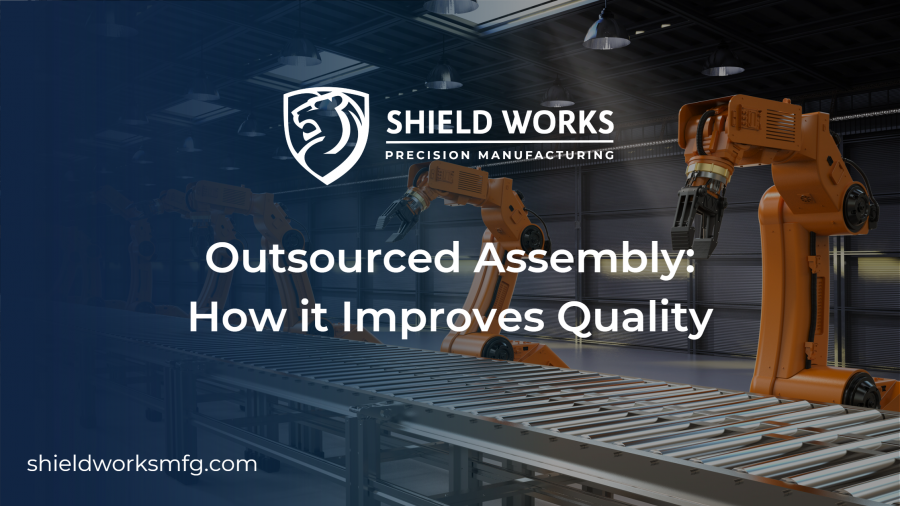
Outsourcing assembly work has become an increasingly popular solution for businesses looking to save costs and time. By delegating assembly work to a trusted third-party partner, companies can focus on their core competencies while reaping a variety of benefits, including cost savings and improved product quality.
In this article, we will explore the ways in which outsourced assembly can help improve quality, increase efficiency, and boost profitability for your business.
Benefits of Outsourced Manufacturing
Reduced Costs
One of the primary benefits of outsourcing assembly work is cost savings. Companies can avoid the costs associated with investing in equipment, machinery, and labor.
Additionally, they can sidestep the expenses associated with employee training, insurance, and benefits. This can result in significant cost savings for businesses of all sizes.
Improved Quality
Outsourcing assembly work to a trusted third-party partner can help improve the quality of your products. These partners specialize in assembly work and have the experience and expertise needed to ensure that your products are manufactured to the highest standards.
They use standardized processes to ensure consistency in the production of your products, minimize errors and defects, and use advanced testing and inspection methods to detect defects and ensure that your products are free from defects.
Increased Efficiency
Outsourcing assembly work can increase efficiency by allowing companies to focus on their core competencies. Employees can spend more time on high-value tasks, such as research and development, marketing, and sales.
This can help businesses to operate more efficiently, streamline their operations, and reduce the time and effort required to produce high-quality products.
Access to Specialized Equipment
Outsourcing assembly work gives companies access to specialized equipment and machinery that they may not have in-house.
This can help businesses to produce high-quality products that meet their customers’ needs. They can also take advantage of the latest technology to improve their assembly processes and increase productivity.
Scalability
Outsourced assembly work can be easily scaled up or down depending on business needs. Companies can adjust the volume of work based on demand without having to worry about hiring and training new employees.
This can help businesses to be more agile and responsive to changing market conditions.
How Outsourced Assembly Improves Quality
Outsourced assembly work can improve the quality of your products in several ways.
Consistency
Outsourced assembly partners follow standardized processes and procedures to ensure consistent quality in the production of your products. This consistency helps to minimize errors and defects, resulting in higher-quality products. By utilizing assembly partners with standardized processes, you can ensure that each product produced meets the same high-quality standards.
Quality Control
Outsourced assembly partners have robust quality control processes in place to ensure that your products meet the highest standards. They use advanced testing and inspection methods to detect defects and ensure that your products are free from defects.
This level of quality control can be difficult to achieve in-house, where resources are often spread thin across many different tasks.
Expertise
Outsourced assembly partners specialize in assembly work and have the expertise and experience needed to produce high-quality products. They can help you identify areas for improvement and make recommendations to optimize your assembly processes.
By leveraging the expertise of these partners, you can improve the quality of your products and identify ways to streamline your assembly process.
Technology
Outsourced assembly partners use advanced technology to improve the quality of your products. They use cutting-edge equipment and software to ensure that your products are manufactured to the highest standards.
By utilizing these technologies, you can ensure that your products are produced with greater accuracy, consistency, and efficiency, resulting in higher-quality products.
Compliance
Outsourced assembly partners are up-to-date on the latest regulations and compliance standards. They can help you ensure that your products meet regulatory requirements and avoid costly fines and penalties.
By working with a partner that is knowledgeable in compliance standards, you can improve the quality of your products and ensure that they are in line with industry regulations.
Outsourcing assembly work can help businesses to reduce costs, improve quality, increase efficiency, and boost profitability. By delegating assembly work to a trusted third-party partner, companies can focus on their core competencies and take advantage of specialized equipment, technology, and expertise.
This can help businesses to be more agile and responsive to changing market conditions and produce high-quality products that meet their customers’ needs.
If you are looking for a product assembler that can help you just that, Shield Works is your perfect option. All your products will be assembled in our in-house facility by a professional team, with our exclusive IP protective zone housed inside. 18 years of experience have well prepared us to bring you a hassle-free and smooth journey to make your dream product. Contact us today!
OEM vs ODM Manufacturing: The Differences Explained
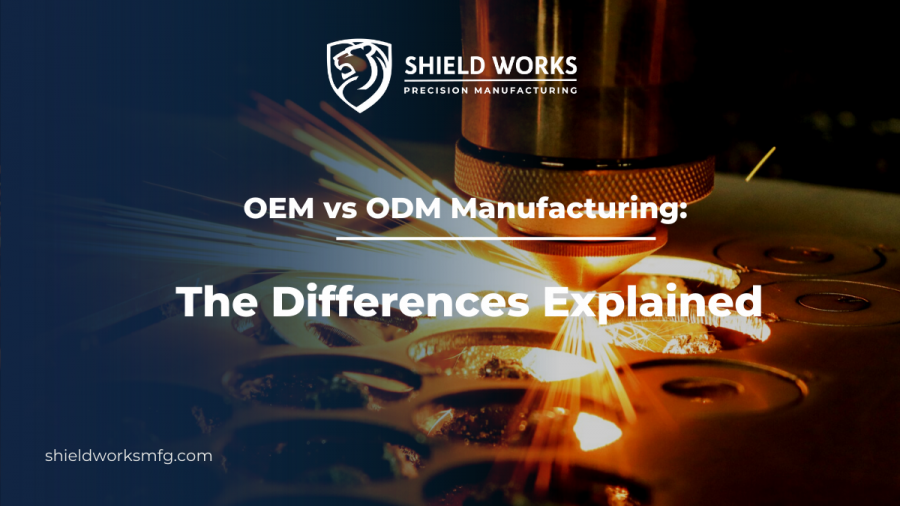
It can be hard to understand the differences between OEM and ODM manufacturing, especially when you’re not familiar with all the jargon.
Even if you’re pretty savvy when it comes to business, some of the language used in the manufacturing world can be confusing. What’s more, these terms are often used interchangeably, which only adds to the confusion.
In this article, we’ll explain the key differences when it comes to OEM vs ODM manufacturing so that you can make an informed decision about which manufacturing is right for your business.
Read on for more details:
OEM vs ODM Can Be Confusing
OEM vs ODM manufacturing can be a confusing comparison to understand. OEM stands for Original Equipment Manufacturer while ODM stands for Original Design Manufacturer.
OEM manufactures products as specified and designed by another company (the “original” company), but with its own branding and logo.
An ODM, however, designs the product according to its customer’s specifications but then produces it under its own label.
Differences in Manufacturing
Original manufacturers make designs for their products. They give parts and materials to other people. The other people put the parts together to make the product.
ODM is different from other types of design. The original designer only makes the design, then they hire a different company to make the product with their own label.
OEMs and ODMs are companies that make things. OEMs are big companies that make a lot of one type of thing. ODMs are smaller companies and they can be experts in making one special kind of product.
This lets them have more control over how much it costs to make stuff and it helps them check the quality too.
What About Scale and Cost?
OEMs make lots of things at the same time, so it is cheaper. They also have access to special technologies that help them make better products that are good quality.
OEMs use their special knowledge to make the best products. They use the latest methods and techniques when making them.
On the other hand, ODM provides flexibility and customization options that OEMs may not offer.
ODMs (Original Design Manufacturers) can make special things that customers want. They can also save money because they focus on certain parts of making stuff.
They Are Both Very Different
OEM and ODM can be different for each company. It is important to know the good and bad things about them before you choose one.
OEMs are good at certain things and can save you money. But you won’t have as much control over the cost and quality. ODMs are more expensive but they give you more control.
If you own a business, it is important to know the difference between OEM and ODM manufacturing. This will help you find high-quality items at good prices.
OEM companies are usually bigger than ODM companies because they focus on making one type of product.
This means that the company can use their knowledge and the best ways to make products for customers.
OEMs make a lot of products. They can make them cheaper and people get good quality products.
On the other hand, ODMs are smaller, more specialized companies that focus on specific areas of manufacturing.
This lets them make special designs based on what customers want. It also might cost less to produce because they are good at certain things.
However, OEMs may offer more control over production costs and quality than ODMs.
It Depends on Your Requirements or Needs
OEM and ODM manufacturing are different. It is important to know the good and bad of each one before picking one.
Original Equipment Manufacturers (OEMs) are experts in some areas and can save you money. But they do not have as much control over how much things cost or how good the quality is.
Original Design Manufacturers (ODMs) give you more options to customize, but it usually costs more money.
It’s important to know the difference between OEM and ODM manufacturing when making products. This will help you make the best quality items at a good price.
Learning about OEM and ODM manufacturing can help you get the best product for your business. It will also be a good price.
OEM and ODM are different. Knowing the difference can help you pick the right one for your business. This will help you get good value for your money.
OEMs may give cost savings but less control over production costs, while ODMs offer flexibility but may be more expensive.
Ultimately, it’s important to weigh all these factors when comparing OEM vs ODM to find a solution that fits your company’s needs and budget.
Get the Full Picture to Make an Informed Decision
By understanding OEM vs ODM manufacturing and their respective advantages, companies can make informed decisions when selecting the right partner for their production needs.
OEM manufacturers provide expertise in certain areas and cost savings, while ODMs provide flexibility and customization as well as potentially lower production costs.
Taking the time to understand OEM and ODM manufacturing trends can help ensure you find the best solution for your business needs and receive a quality product design at a competitive price.
They Are Both Beneficial to the Right Business
The differences between OEM manufacturing and ODM manufacturing are substantial but can be a beneficial tool for businesses looking to produce high-quality products at competitive prices.
OEMs offer greater economies of scale, access to advanced technologies, and more control over production costs and quality, while ODMs are more specialized and provide greater flexibility and customization.
Ultimately, understanding OEM vs ODM manufacturing products is essential for businesses looking to get the most out of their production investments.
OEM vs ODM, Which Is It for You?
Hopefully, this blog post has provided you with a clearer understanding of the differences IN OEM vs ODM manufacturing. From quality control standards to operations, material selection, customer service, and more.
Selecting the right type of manufacturing process for your business needs is an important decision. Knowing the differences between OEM and ODM helps you to get the product that perfectly meets your needs and budget.
To learn more about how we can help meet your specific product requirements, check out our blog today!
Custom Manufacturing vs. Mass Production: Which is Right for Your Business?
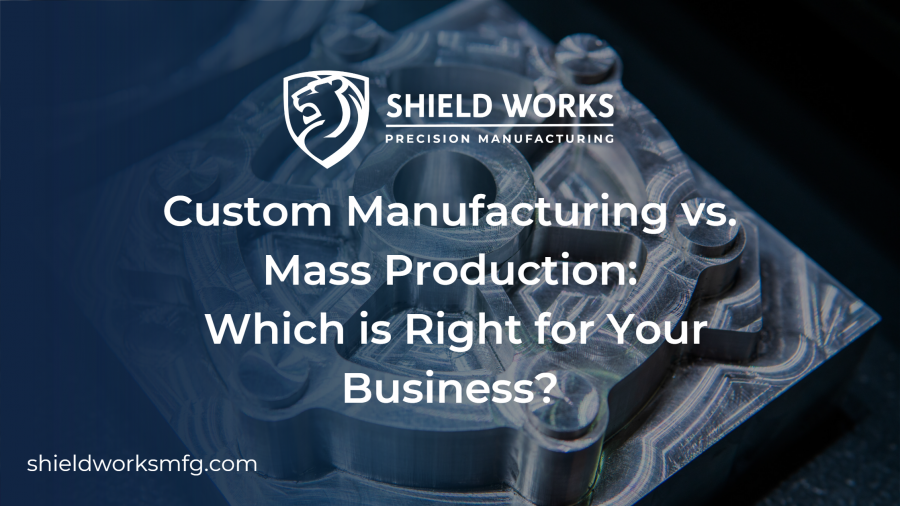
As a business owner, you’re faced with the challenge of choosing between custom manufacturing and mass production when it comes to producing your products.
While both have their advantages and disadvantages, the choice you make can have a significant impact on your business’s success.
In this post, we’ll explore the differences between custom manufacturing and mass production and help you determine which approach is right for your business.
What is Custom Manufacturing?
Custom manufacturing is the process of creating unique products to meet a specific customer’s needs or requirements. The process involves working closely with the customer to design and produce the product.
Custom manufacturing typically involves a more hands-on approach and requires a higher level of skill and expertise.
Benefits of Custom Manufacturing
Customization
Custom manufacturing allows you to create unique products that are tailored to meet the needs of your customers. This level of customization can help you differentiate yourself from your competitors and build a loyal customer base.
Quality
Custom manufacturing typically results in higher quality products as each product is made with specific requirements and standards in mind.
Flexibility
Custom manufacturing allows you to be more flexible in your production process, making changes and adjustments as needed to meet customer demand.
What is Mass Production?
Mass production is the process of creating a large number of identical products using standardized processes and equipment.
The goal of mass production is to produce products quickly and efficiently while minimizing costs.
Benefits of Mass Production
Efficiency
Mass production allows you to produce a large number of products quickly and efficiently. This approach is ideal for businesses that have high demand for their products.
Lower Costs
Mass production can help you reduce your production costs as you can take advantage of economies of scale.
Consistency
Mass production ensures that each product is identical in quality, size, and shape, making it easier to manage inventory and maintain quality control.
What Should Factor into Your Decision-Making?
Product Complexity
One important consideration when deciding between custom manufacturing and mass production is the complexity of the product.
Custom manufacturing is ideal for producing complex, specialized products that require a high level of skill and expertise. This approach allows for greater customization and flexibility, making it easier to produce products that meet specific customer needs.
For example, a custom electronics manufacturer may need to create a unique circuit board design to meet a specific customer’s requirements.
On the other hand, mass production is more suitable for simpler products that can be produced efficiently using standardized processes and equipment.
This approach is ideal for products that have a high demand and can be produced in large volumes. Mass production is commonly used for products such as electronics, clothing, and food items.
Target Market
Another factor to consider is the target market. Custom manufacturing is more suitable for businesses that target a specific niche market or offer specialized products.
This approach allows you to tailor your products to the specific needs and preferences of your target audience.
On the other hand, mass production is better suited for businesses targeting a broader market with a high volume of customers. This approach allows for efficient production and cost savings that can be passed on to the customer in the form of lower prices.
Quality Control
When it comes to quality control, custom manufacturing has the advantage of producing high-quality products that meet specific standards and requirements. Each product is made with individual attention and care, ensuring that the end product is of the highest quality.
On the other hand, mass production can lead to inconsistencies in quality due to the large volume of products produced. However, with proper quality control measures, it is possible to maintain a high level of quality in mass-produced products.
Environmental Impact
Another factor to consider is the environmental impact of each approach. Mass production can result in a large amount of waste due to overproduction, obsolete products, or products that go unsold.
On the other hand, custom manufacturing can be more environmentally friendly as it involves producing products on a smaller scale, reducing waste, and using fewer resources.
Hybrid Approach
A hybrid approach that combines elements of both custom manufacturing and mass production can provide the benefits of both approaches. This approach allows for greater flexibility and customization while still taking advantage of economies of scale.
For example, a company that produces custom clothing may use mass production techniques for the most popular designs and custom manufacturing for specialized or unique items.
By carefully evaluating each approach’s advantages and disadvantages and considering your business’s specific needs, you can make an informed decision that helps your business succeed.
Choosing between custom manufacturing and mass production is a decision that should be carefully considered as it can have a significant impact on your business’s success. By understanding the benefits of each approach and your business’s unique needs and goals, you can make an informed decision that will help you grow and succeed.
With Shield Works, you can have them both. Our in-house facility and professional team of engineers with proven experience will provide you with a streamlined process that combines the perks of both types of manufacturing. Contact us today!
